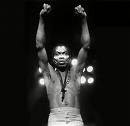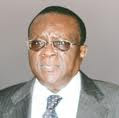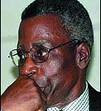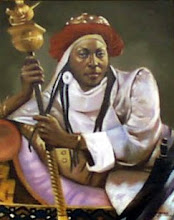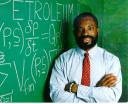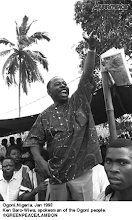By Rolland Nwanua
No one begged to come into this world. I believe that a man does not deserve to bring a child into this world until he has created a favourable ground for the child. If you think the atmosphere in the society, in the country is not favourable for you, why bring someone else to suffer the same fate?
You desire so much to leave the country to a place where you can accumulate riches for yourself. You may actually succeed. But no amount of wealth you accumulate can really guarantee the future of your children. Material wealth have no reality of their own, they can fade away at any moment.
I know of a billionaire investor who lost his investments in 3 months. He committed suicide because he couldn’t stand it.
And if you succeed in staying on top through out your lifetime without falling, what guarantee do you have that your children – who don’t know all the pain it took you to accumulate the riches – will be able to manage what you left for them?
The most formidable guarantee you can give yourself is to build a nation rather than build a man.
Let us sacrifice today. Let us use today to appease God so He can bless our tomorrow.
If the economy is buoyant and, there is political stability and, everything else is in its right proportion, the only labour that the next generation will perform will be that of harvesting.
Men and women of my generation, let us sow the seed, even if we have to do it in tears; let us water it, though it may be painful to our body; let us, then, wait patiently for our crop to mature, even if we have to do so with hunger in our stomach; we shall then get the reward of harvesting with smiles on our faces. Our children and children’s children will not suffer the same fate that their fathers suffered. They will harvest with smiles on their faces the ripe fruits.
This was what some men did that made some nation to be known today as developed. This is what men with reason do. It is the attribute of wise men. Men and women of my generation, let us sacrifice today for tomorrow.
Friday, March 12, 2010
Wednesday, March 3, 2010
BOLA IGE
By Elvis Abu
He was a Senior Advocate of Nigeria and a politician. He was born September 13, 1930 in Zaria, northern Nigeria. His parents were of Yoruba tribe from Esa-Oke village, in the old Oyo State (now in Osun State).
He studied at Ibadan Grammar School between 1943 and 1948 and, the University of Ibadan. He proceeded to London where he continued his education at the University College London. In 1959 he got a degree in Law in this university. In 1961 he was called to bar in London’s inner Temple.
At age 31 he was at the frontline of the action group crisis; this was during the first republic 1963-1966.
Between 1967 and 1970 Bola Ige was the Commissioner for Agriculture in the western region of Nigeria. In the early 1970s, he gave his energy to the anti-racism campaign of the World Council of Churches.
In 1979, during General Olusegun Obasanjo’s administration, Ige was elected governor of Oyo State and he served until 1983. He had become friends with the General some year earlier.
When General Olusegun Obasabjo came to power again in 1999, Ige was appointed Minister of Justice and Attorney General of the Federal Republic of Nigeria. He opposed the idea of Sharia Law being imposed in the Northern Nigeria.
When president Obasanjo went on official visit to Oyo State, he was received in a presidential reception at the liberty stadium, joined by Bisi Akande, the governor of Osun State, Lam Adesina, the governor of Oyo State and Bola Ige. Bisi Akande narrated how the crowd welcomed Ige, who entered after the others, with “a jubilant and deafening shouts of Ige! Ige!! Ige!!!” The love the people had for him made him steal the show in a presidential reception where the president of the country was expected to get the highest attention.
While in prison, he wrote a book titled: People, Politics and Politicians of Nigeria: 1940-1979, among others.
A man loved by the people; he was a patron of the arts, a mentor to the youths.
On 23 December 2001, he died by the bullet of an assassin right in his own home. He was mourned by Nigerians all over and, justice was demanded for his murder.
References: www.wikipidia.com
www.dawodu.com
He was a Senior Advocate of Nigeria and a politician. He was born September 13, 1930 in Zaria, northern Nigeria. His parents were of Yoruba tribe from Esa-Oke village, in the old Oyo State (now in Osun State).
He studied at Ibadan Grammar School between 1943 and 1948 and, the University of Ibadan. He proceeded to London where he continued his education at the University College London. In 1959 he got a degree in Law in this university. In 1961 he was called to bar in London’s inner Temple.
At age 31 he was at the frontline of the action group crisis; this was during the first republic 1963-1966.
Between 1967 and 1970 Bola Ige was the Commissioner for Agriculture in the western region of Nigeria. In the early 1970s, he gave his energy to the anti-racism campaign of the World Council of Churches.
In 1979, during General Olusegun Obasanjo’s administration, Ige was elected governor of Oyo State and he served until 1983. He had become friends with the General some year earlier.
When General Olusegun Obasabjo came to power again in 1999, Ige was appointed Minister of Justice and Attorney General of the Federal Republic of Nigeria. He opposed the idea of Sharia Law being imposed in the Northern Nigeria.
When president Obasanjo went on official visit to Oyo State, he was received in a presidential reception at the liberty stadium, joined by Bisi Akande, the governor of Osun State, Lam Adesina, the governor of Oyo State and Bola Ige. Bisi Akande narrated how the crowd welcomed Ige, who entered after the others, with “a jubilant and deafening shouts of Ige! Ige!! Ige!!!” The love the people had for him made him steal the show in a presidential reception where the president of the country was expected to get the highest attention.
While in prison, he wrote a book titled: People, Politics and Politicians of Nigeria: 1940-1979, among others.
A man loved by the people; he was a patron of the arts, a mentor to the youths.
On 23 December 2001, he died by the bullet of an assassin right in his own home. He was mourned by Nigerians all over and, justice was demanded for his murder.
References: www.wikipidia.com
www.dawodu.com
Subscribe to:
Comments (Atom)
